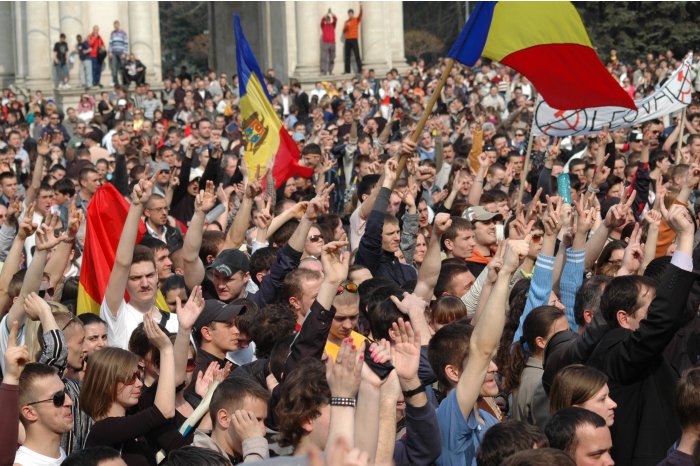7 April 2009. Large, devastating, very strange protest takes place in Chisinau
10:33 | 05.04.2021 Category:
Chisinau, 5 April /MOLDPRES/- Moldovan society at the time of the April 2009 parliamentary elections was tired of the communist government. Rather, the more educated part of society wanted a change that would offer more freedom, genuine political pluralism and the right to move freely in the Western value space. There was a clear civilizational contradiction between the old rulers and the horizon of expectations of the younger generation. Yet, the communist government caught a good period from an economic point of view, and most citizens were basically operating with such notions as salary, pension, prices.
The results of the 5 April elections faithfully reflected these realities. On the morning of 6 April the Central Electoral Commission announces the preliminary results of the election after processing 96.51% of reports of the polling stations: PCRM - 49.94% of votes (60 seats), PL - 12.82 % of votes (16 seats), PLDM - 12.27% of votes (14 seats), Our Moldova Alliance - 9.83% of votes (11 seats).
Immediately, protest messages appear on social networks that vehemently challenge the election results. "April 6 - National Day of Mourning. If you did not vote for PCRM - take a candle and go out !!! See you at 18.00, at Ștefan cel Mare! ”, Was the most viewed message in the afternoon of 6 April. It was obvious that there was already a center that came with a very clear political approach, prepared in advance and aimed at a social-target group, ie the youth.
Opposition parties were not prepared for such events, but seeing their magnitude, they were quick to join. The leaders of these political parties still believed that everything was spontaneous and could use the energy of young people. Only the next day did some of them realize that the scenario was much more serious, and the finality was to remove Voronin from power at all costs.
On 7 April around 10.00, more than 7-8 thousand protesters are already present in PMAN, the overwhelming majority being young people. As ordered, in an exemplary manner, thousands of participants headed to the space where the buildings of the Presidency and Parliament were located.
Opposition politicians were also overwhelmed by the situation. Vlad Filat, leader of the Liberal Democratic Party, made an attempt to redirect the crowd to PMAN, where microphones were installed, but without success. Soon stones began to fly to the windows of the Presidency, then the Parliament. Law enforcement forces, after a simulation of action, practically withdrew and the destruction of the interior of the central institutions of the state by the protesters began. In an improbable way, in the presence of some deputies from the government, the Romanian flag was hoisted on the presidency building, which suggested that the real organizers wanted from the beginning to direct the suspicions towards someone else.
Destruction, robbery and burning of the interior of the floors of both institutions follows. In a strange way, the Parliament's archive was set on fire. The constitutive acts of the Republic of Moldova, the Declaration of Independence and the Constitution of the country were destroyed by burning, even if the metal safes were not even opened. These extremely dubious things have not been elucidated by the Moldovan judiciary until today.
Towards evening, the spirits calmed down and the protesters left the "battle arena". Soon, in an extremely violent way, the police react, catching people around them without any argument. About 200 citizens are detained, many of them being brutally ill-treated. Following the blows received from the police in PMAN, the young Valeriu Boboc died late in the evening, when the events were already over. The next day, the police raid the educational institutions and detained about 160 suspects.
President Voronin hastened to blame Romania and the European Union, expelled the Romanian ambassador and introduced visas for Romanian citizens. Later, the Russian blogger Baghirov was detained and brought to justice, who was accused that, in complicity with some of our people, he prepared and provided information support for the devastating actions. But, even in this case, inexplicable things followed. Baghirov was soon released on parole and left the Republic of Moldova unhindered. Cases of torture, the burning of the Declaration of Independence and the Constitution, the very strange behavior of Voronin's party colleagues, the role of the most disciplined and active groups of devastators and many others have mysteriously disappeared into oblivion.
So far, the society has no answers about the origin, screenwriters and directors of the 7 April event. The broad horizon of investigations has become so narrow that it has become a point of view.

